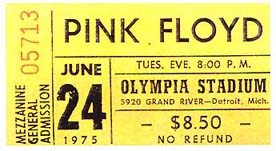

Wish was inspired by a simple guitar figure David Gilmour came up with. "The whole thing started out of that first guitar thing, that "ding -ding-ding-ding." I was just in the studio rehearsal room during one day and playing with the guitar and those notes started coming out, just a little motif on the guitar. I played it a few times, and I put some DDL's and other effects on it and started playing again and it sort of pinged out and sounded nice and I said "oh, that's really great." Roger really got off on it, he got exactly the same from it as I was getting from it. I don't know quite how it happened, but those sort of things happen. That was like the start of--gave us the start for making the whole record." David
Pink Floyd took a short break from both live performance and recording between late 1973 and early
1974.
Both Gilmour and Mason, for the first time, got involved in projects outside of the band...with David
helping Kate Bush, and a young down on their luck band called "Unicorn", get a start in the recording
business...while Nick lent his hand, along with Robert Wyatt, to producing Principal Edward's
Magic Theater.

Back in the studio by early 1974, Pink Floyd was hard at work, where many of the songs for the next two albums
would emerge, not least a stunning new title, 'Shine On' (later changed to 'Shine On You Crazy Diamond'), an ode
to Syd Barrett.
Despite enormous problems with the French Tour of 1974, sell-outs in five cities in which Pink Floyd performed set new records for audience attendance in France.
November 15, 1974 The second half and encore of the show was recorded by BBC Radio One. The line 'I've been mad for f*cking years' in 'Speak To Me' was removed in the mix. The show was broadcast on Alan Freeman Show on January 11th, 1975.
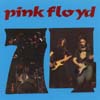 An unauthorized recording of the Trentham Gardens Concert of November
19, 1974, found it's way onto a bootleg album (perhaps the first mass-produced illegal record
to date) which reportedly sold well in excess of 100,000 copies. The album, British
Tour '74 was thought to have been pressed in Germany or the Netherlands, and had it been officially released, would have gained God Record status.
An unauthorized recording of the Trentham Gardens Concert of November
19, 1974, found it's way onto a bootleg album (perhaps the first mass-produced illegal record
to date) which reportedly sold well in excess of 100,000 copies. The album, British
Tour '74 was thought to have been pressed in Germany or the Netherlands, and had it been officially released, would have gained God Record status.
On Monday 13th of January, 1975 Pink Floyd entered EMI's newly refitted Studio 2 at Abbey Road to start work on their
seventh studio album 'Wish You Were Here'. Because of their tour commitments the sessions took place
either side of and between two tours of the USA.
 When it came time to record 'Have a Cigar', Roger's admittedly limited voice was in shreds from his struggles with the 'Shine On
You Crazy Diamond' lead vocal. Waters invited the Floyd's friend and longtime harvest label-mate Roy Harper to take the mike on "Cigar."
Roy at the time was recording his own album 'H.Q. to which Dave had already contributed some guitar licks, in another Abbey Road Studio.
When it came time to record 'Have a Cigar', Roger's admittedly limited voice was in shreds from his struggles with the 'Shine On
You Crazy Diamond' lead vocal. Waters invited the Floyd's friend and longtime harvest label-mate Roy Harper to take the mike on "Cigar."
Roy at the time was recording his own album 'H.Q. to which Dave had already contributed some guitar licks, in another Abbey Road Studio.
The line, 'By the way, which one is Pink?' came about from real experience, it was asked by an American record executive.
Stephane Grappelli guest starred on the album...he played the fiddle at the end of Wish You Were Here.
On April 1, 1976 thieves broke into David Gilmour's home and stole guitars worth £6,500 from his collection.
Syd Barrett surprised everyone in an uncanny, and sudden appearance in the studio at precisely the moment the band was going through the final playbacks of
'Shine On You Crazy Diamond', their 'unofficial' tribute to him. What was most bizarre about the whole visit was that none of the band
recognized Syd at first, thinking he might be the caretaker.
Thirty tons of equipment, much of it shipped over from England, was transported around the country, and it took a full-time road crew of seventeen to make the event possible. The band also chartered a private jet to travel between shows, while the road crew moved the gear in a convoy of articulated trucks.
CBS Records used FM radio to alert fans to a specially prepared Pink Floyd show which was simulcast early that month to the seven major cities where they were booked to play. Within hours, all of the dates had completely sold out, breaking all venues box office records, including those of the Los Angeles Sports Arena, which in a single day sold all of its 67,000 tickets for the band's scheduled four-night run. Even an extra fifth show sold out within hours so great was the demand for tickets.
Additional touring personnel for the American tours were Vanette Fields and Carlena Williams, backing vocals, and Dick Parry on the saxophone.
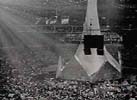 Pink Floyd employed Mark Fisher and Jonathan Parks to design a mobile structure resembling a giant Pyramid. Assembled in record time the structure
made its maiden flight at the huge Three Rivers Stadium in Pittsburgh. The huge pyramid, its base sixty-six foot square and its height the same,
was held by guides and launched from the back of the stage. It rose some distance before the wind blew it over dislodging the huge helium balloon
inside. The balloon was never seen again; nor was the pyramid, which after crashing into a number of vehicles was
shredded in minutes by fans.
Pink Floyd employed Mark Fisher and Jonathan Parks to design a mobile structure resembling a giant Pyramid. Assembled in record time the structure
made its maiden flight at the huge Three Rivers Stadium in Pittsburgh. The huge pyramid, its base sixty-six foot square and its height the same,
was held by guides and launched from the back of the stage. It rose some distance before the wind blew it over dislodging the huge helium balloon
inside. The balloon was never seen again; nor was the pyramid, which after crashing into a number of vehicles was
shredded in minutes by fans.
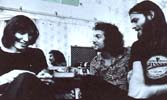
The art work again was quite unique and designed by Storm Thorgerson and friends at Hipgnosis.
Wish You Were Here was released on September 15, 1975. After the tour was finished.
In Britain, the album hit number one in its second week on the Billboard Charts , where it went directly to the top on the strength of a quarter-million advance sales. EMI was unable to keep up with the unprecedented demand. Even with its pressing plants working overtime, the company had to inform retailers that only 50 percent of each order could be filled.
At the time, Wish You Were Here was the fastest-selling of all Pink Floyd albums, topping record charts the world over.
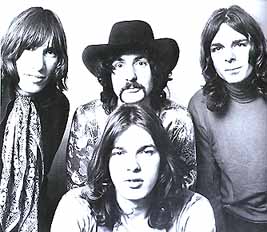
"Steel Breeze? Well, Syd was seriously cut up by the winds that were wafting in through those early days of rock'n'roll. That's all. He was carved by it." - Roger
"For me, 'Wish You Were Here' was very satisfying. I'd rather listen to it than Dark Side Of The Moon. I think we achieved a better balance of music and lyrics. 'Dark Side' went a bit too far the other way -- too much importance was placed on the lyrics. And sometimes the tunes were neglected." - David
"After Dark Side we were really floundering around. I wanted to make the next album more musical, because I felt some of these tracks had been just vehicles for the words. We were working in 1974 in this horrible little rehearsal room in Kings Cross without windows, putting together what became the next two albums." - David
"The whole album sprang from that one four-note guitar phrase of Dave's in Shine On. We heard it, and went, 'That's a really nice phrase.' The wine came out, and that led to what I think is our best album, the most colourful, the most feelingful." - Roger
"This was much a more difficult record to make. Roger was getting crosser. We were all getting older. We had children. There was much more drama between us, people turning up to the studio late, which we generally hate. There was more pressure on me to make the drumming more accurate and less flowery. But I think as an album it flows really well. It's like a descendant of Meddle in terms of the use of repeating themes, and the pacing." - Nick
"At that point, all our ambitions were realized. When you're fifteen and you think, 'Right, I'm gonna start a group...' The pinnacle that you see (apart from very vague thoughts about rather smart bachelor flats and not having to get up till four in the afternoon)... is the Big Album. The Number One in Billboard. And once you've done that, a lot of your ambitions have been achieved." - Roger
"Suddenly one was aware that Pink Floyd was becoming a product, and a lot of our time and energy was spent hassling about the business side of running a group, rather than playing. Which is not a good thing..." - Rick
"We always like to write numbers, go on the road with them and record them later. We did this with 'Darkside of the Moon' and we think it's easily the best way to go about it. A number changes so much when we do it live over a long period. 'Shine On' has changed a lot since we started already." - Rick
"I definitely think that at the "Wish You Were Here" recording sessions most of us didn't wish we were there at all, we wished we were somewhere else. I wasn't happy being there because I got the feeling we weren't together. The album is about none of us really being there, or being there only marginally. About our non-presence in the situation we had clung to through habit, and are still clinging to through habit - being Pink Floyd." - Roger
"It took us a long time before we actually got into really getting down and making the album. There was a lot of sitting around. I think all of us were playing halfheartedly as well. It was a difficult period after 'Dark Side of the Moon'." - Rick
"I particularly like that record. I think that's my favorite album that the Floyd ever did. I like the feel of it - and in it. It's the kind of music - Dark Side as well - when all three of us were writing, together sometimes. I feel the best material from the Floyd was definitely when two or three of us co-wrote something together. Afterwards we lost that; there wasn't that interplay of ideas between the band." - Rick
"I don't think anyone on our level feels deserving of that kind of superhuman adulation number. But then, a lot of them probably dig it. Sure, I'm cynical of our position.
I don't think we deserve it. But I'm no more cynical of our position than I am of anyone else's of our level. I mean... to try and maintain your own perspective on what you are is totally different.." - David